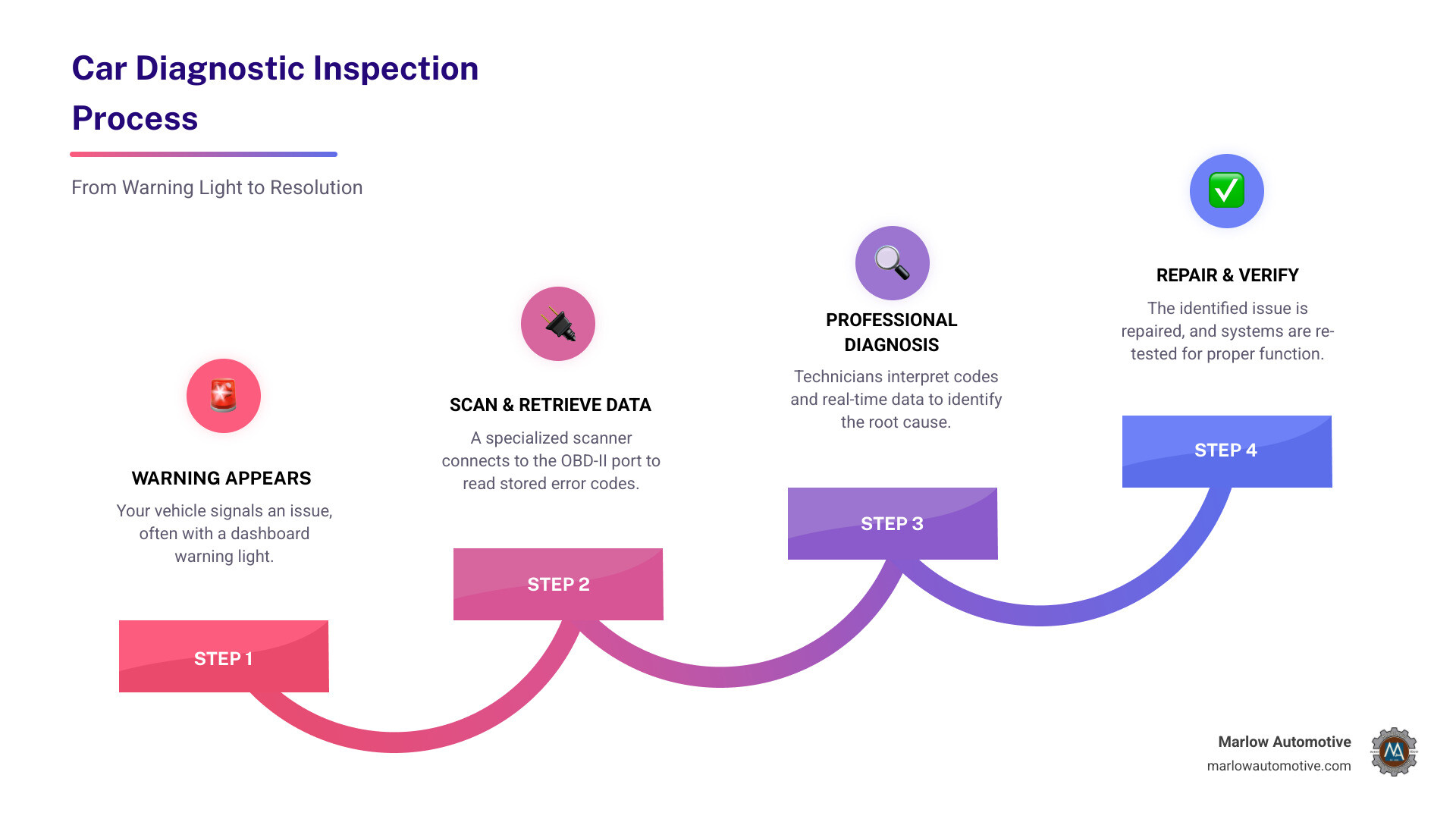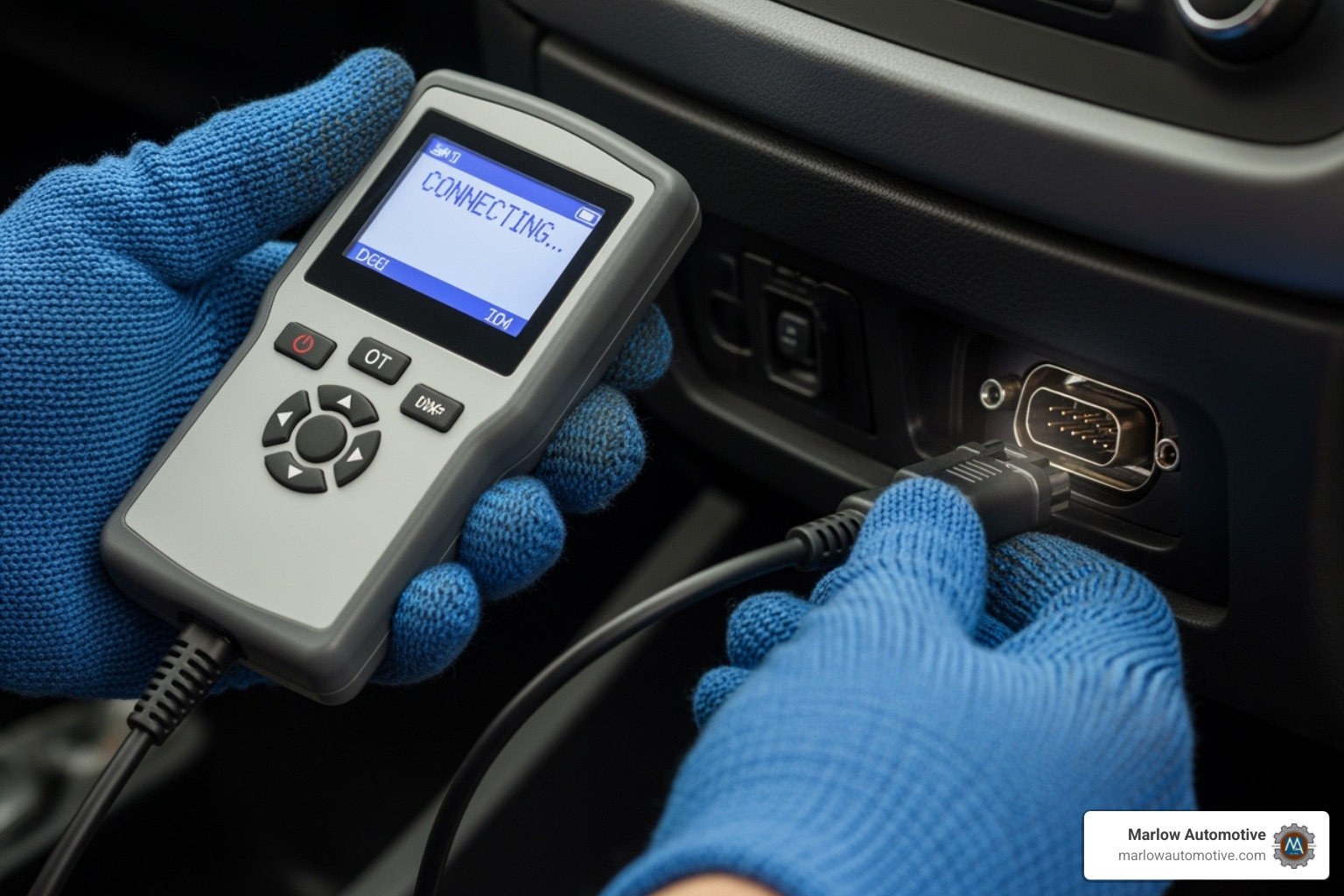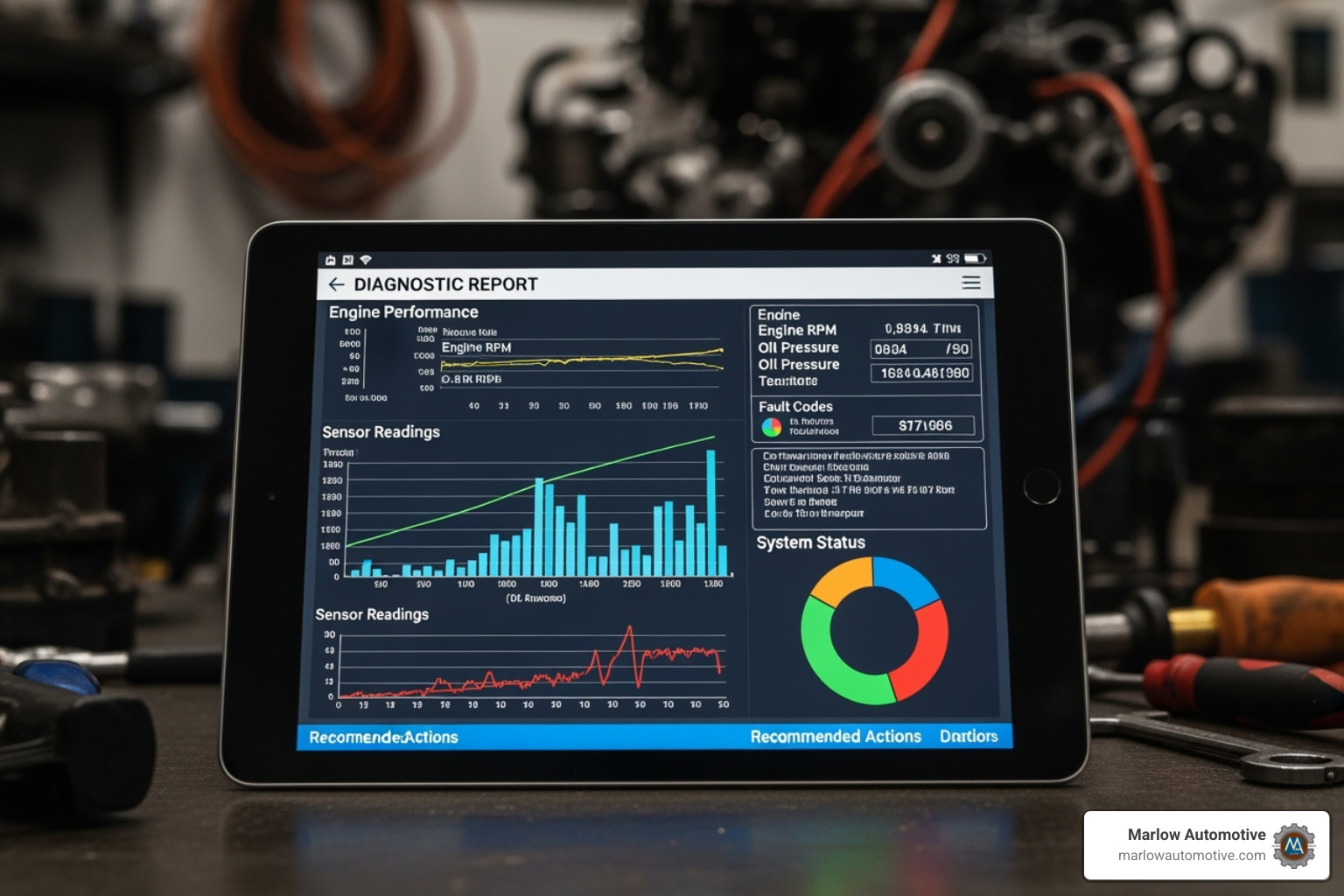Car Condition Inspection: What's Under the Hood and Why It Matters

Why Car Diagnostic Inspections Are Essential for Modern Vehicle Health
A car diagnostic inspection is a digital analysis that uses specialized computer equipment to scan your vehicle's systems for errors, malfunctions, and potential problems before they become dangerous or expensive. Here's what you need to know:
What it does:
- Reads diagnostic trouble codes (DTCs) from your car's computer
- Analyzes engine, transmission, brakes, and other critical systems
- Identifies issues early before they cause breakdowns
- Provides data for accurate repairs instead of guesswork
When you need it:
- Check engine light is on
- Strange noises, smells, or performance issues
- Before buying a used car
- As part of regular maintenance (quarterly recommended)
What it costs:
- Basic diagnostic scan: Around $40
- Comprehensive analysis: $100-$400 depending on complexity
You're driving home from work when that orange glow appears on your dashboard - the check engine light. This can't be good. Modern vehicles have complex computer systems with hundreds of sensors monitoring everything from your engine's performance to your brake system's health. When something goes wrong, these systems store error codes that only diagnostic equipment can read and interpret.
Unlike the simple mechanical problems of older cars, today's vehicles require sophisticated diagnostic tools to understand what's really happening under the hood. A diagnostic inspection goes far beyond just reading codes - it analyzes the why behind the warning and helps prevent minor issues from becoming major repairs.
The difference between a quick code scan and a professional diagnostic inspection can save you thousands of dollars in unnecessary repairs and keep you safe on Plano's busy roads.

How a Car Diagnostic Test Works
Ever wondered what actually happens when you bring your car in for a car diagnostic inspection? It's pretty fascinating, really. Your modern vehicle is essentially a computer on wheels, packed with sensors and microchips that constantly monitor everything from your engine's breathing to how well your brakes are gripping.
The magic starts when we connect a specialized diagnostic scanner to your vehicle's OBD-II port. Every car made since 1996 has this standardized port - and we can thank the Environmental Protection Agency for making this happen back in the 1970s. It's like plugging into your car's brain to see what it's thinking.

Your vehicle's computer is constantly busy, collecting data from hundreds of sensors throughout your car. Think of it as your car's central nervous system - it's monitoring engine performance, checking emission levels, watching your transmission, and keeping tabs on dozens of other systems. When something goes outside normal limits, it stores a Diagnostic Trouble Code and often lights up your dashboard like a Christmas tree.
But here's where it gets really interesting. Our diagnostic scanner doesn't just read those stored codes - it also taps into real-time data flowing from all those sensors. We can literally watch your car's vital signs as it runs, seeing things that would be impossible to detect any other way. This live data stream is what separates a true car diagnostic inspection from a simple code reading.
What is a Diagnostic Trouble Code (DTC)?
A Diagnostic Trouble Code is basically your car's way of leaving you a note that says "Hey, something's not quite right over here." These five-character codes follow a specific code structure that tells us exactly where to start looking.
The first letter is like a street address for the problem. P codes point to your powertrain - that's your engine, transmission, and fuel system. These are the troublemakers that usually trigger your check engine light. C codes involve your chassis systems like brakes and steering, while B codes deal with body electronics like power windows or airbags. U codes are the communication specialists - they pop up when different parts of your car's computer system can't talk to each other properly.
The beauty of this system is that it gives us both generic codes that work the same way across all vehicles, and manufacturer-specific codes that dive deeper into your particular make and model's unique quirks. It's like having a universal translator for car problems.
But here's the thing - and this is crucial - a DTC is just the starting point for diagnosis. It's like your car saying "my stomach hurts" without telling you if it ate too much pizza or has the flu. That code might point to a problem area, but figuring out the real cause? That takes experience and proper testing.
For example, when your check engine light comes on, the code might say there's an issue with your oxygen sensor. But is the sensor actually bad, or is something else causing it to read incorrectly? That's where our detective work really begins.
The Full Scope of a Car Diagnostic Inspection
When you bring your vehicle to Marlow Automotive for a car diagnostic inspection, you're getting far more than someone plugging in a scanner and calling it a day. Think of it as a comprehensive health checkup for your car - we're looking at everything from your engine's heartbeat to your transmission's reflexes.

Our thorough diagnostic process examines every major system in your vehicle. We check your engine performance for issues like misfires or timing problems, analyze your transmission for shifting troubles, inspect your braking system including ABS components, and examine your exhaust system for catalytic converter or oxygen sensor issues.
But we don't stop there. Your electrical system gets scrutinized for battery, alternator, or wiring problems. We investigate your cooling system for thermostat failures or coolant leaks - because catching a small leak early can save you thousands in engine damage later. Your fuel system also gets attention, from fuel pumps to injectors, ensuring everything works together smoothly.
Professional Car Diagnostic Inspection vs. Basic Code Reading
Here's where things get interesting. Many folks think getting a free code scan at an auto parts store is the same as a professional car diagnostic inspection. Not quite. It's like the difference between someone telling you "your knee hurts" versus a doctor explaining why it hurts and how to fix it.
Reading the code is just the beginning. That free scan might tell you there's a P0133 oxygen sensor code, but it won't tell you if the sensor itself is bad, if there's a wiring problem, or if an exhaust leak is causing the sensor to read incorrectly. You could end up replacing a perfectly good sensor and still have the same problem.
Interpreting the 'why' is where our expertise shines. Our ASE-certified technicians use advanced diagnostic tools that go beyond basic code reading. We analyze live data streams, run component tests, and compare your vehicle's current performance with factory specifications.
Pinpointing the root cause means we fix the actual problem, not just throw parts at symptoms. This approach avoids unnecessary repairs and saves you money. Our technician expertise ensures we get to the bottom of issues that might stump less experienced mechanics.
| Feature | Free Code Scan | Professional Car Diagnostic Inspection |
|---|---|---|
| Information Provided | Just the trouble code | Code, root cause, specific component failure, complete repair plan |
| Cost | Often free | $40-$400 (depending on complexity) |
| Accuracy | Limited, often misleading | High precision, targets exact problem |
| Future Problem Prevention | None | Identifies potential issues before they become expensive |
What a Diagnostic Test Examines
During your comprehensive car diagnostic inspection, we examine interconnected systems that work together to keep you safely on Plano's roads. Engine misfires get tracked down to their source, whether it's spark plugs, ignition coils, or fuel delivery issues. If we find problems that need attention, our engine repair services can get you back on track.
Transmission issues show up in our diagnostics long before you feel that first hard shift. Problems here might need our transmission service to prevent costly failures down the road.
ABS issues and brake system problems are serious safety concerns. Our diagnostics can identify sensor malfunctions or components that might need ABS repair. Sometimes it's as simple as worn brake pads that need brake pad replacement.
Oxygen sensors and exhaust system components get thoroughly checked since they affect both performance and emissions. Battery and alternator problems show up clearly in our electrical system analysis - if you need a battery replacement or other electrical services, we'll spot it.
Coolant leaks might seem minor, but they can lead to catastrophic engine damage. Catching and fixing a small leak early can save you $1,000 to $7,000 in engine repairs. Fuel injectors and the entire fuel delivery system get examined to ensure optimal performance and fuel economy.
We also check your steering and suspension components, which can affect vehicle handling and safety. If problems are found, our suspension repair services can restore your vehicle's smooth ride and safe handling.
When and Why to Get a Diagnostic Test
Picture this: you're driving to work on a busy Plano morning when your dashboard suddenly lights up like a Christmas tree. That sinking feeling in your stomach? We've all been there. But here's the thing - car diagnostic inspections aren't just for emergencies. They're your vehicle's way of having a conversation with you about its health.

The most obvious time to schedule a diagnostic test is when warning lights illuminate on your dashboard. Whether it's the check engine light, ABS warning, or that mysterious symbol you can't identify, these lights are your car's polite way of saying "Hey, I need some attention here!"
But warning lights aren't the only signals your vehicle sends. Strange noises or smells are equally important red flags. That grinding sound when you brake? The sweet smell of coolant? These aren't things to ignore while crossing your fingers and hoping they'll go away.
Performance issues tell their own story too. When your car starts hesitating during acceleration, experiencing rough idling, or suddenly drinking gas like it's going out of style, these changes in behavior often point to underlying problems that a diagnostic test can uncover.
Smart car owners also use diagnostic tests proactively. Before a long road trip, it's worth knowing your vehicle is in peak condition - nobody wants to be stranded hundreds of miles from home. Similarly, if you're considering buying a used car, a comprehensive diagnostic inspection can reveal hidden issues that might not show up during a test drive. Our pre-purchase inspections have saved countless customers from making expensive mistakes.
Annual maintenance is another perfect time for diagnostic testing. Even when everything seems fine, your car's computer might be detecting small changes that haven't yet affected performance. Think of it like a yearly physical for your vehicle - catching problems early is always better than waiting for symptoms to appear.
The Benefits of Regular Diagnostics
Regular car diagnostic inspections are like having a crystal ball for your vehicle's future. The benefits extend far beyond just fixing what's broken - they're about preventing problems before they happen.
Early issue detection is perhaps the most valuable benefit. Your car's computer is constantly monitoring hundreds of sensors and systems. When something starts operating outside normal parameters, the computer notices long before you do. This early warning system can identify problems weeks or even months before they cause noticeable symptoms.
The cost savings from early detection are substantial. Here's a real-world example: a minor coolant leak might cost $150 to fix today. Ignore it, and you could face $3,000 to $7,000 in engine damage when overheating destroys internal components. That's not just expensive - it's heartbreaking when it could have been prevented.
Safety improvements are equally important. Many critical systems like brakes, steering, and airbags are monitored by diagnostic systems. Research shows that brake and tire defects account for about 65% of vehicle defects associated with crashes. Regular diagnostics help ensure these life-saving systems are functioning properly.
Your vehicle's performance and longevity benefit significantly from regular diagnostic care. When all systems operate within optimal parameters, your car runs smoother, gets better fuel economy, and lasts longer. It's the difference between a car that serves you reliably for 200,000 miles versus one that becomes a constant source of frustration and expense.
Finally, professional diagnostics ensure accurate repairs. Instead of playing expensive guessing games with parts replacement, our technicians know exactly what needs attention. This precision saves you money and eliminates the frustration of recurring problems that weren't properly diagnosed the first time.
The Practicalities: Cost, Time, and What to Expect
We get it - when your car starts acting up, one of the first things on your mind is "How much is this going to cost me?" Let's break down what you can expect when you bring your vehicle in for a car diagnostic inspection at Marlow Automotive.
Average Cost of a Car Diagnostic Test
The cost of a car diagnostic inspection really depends on what's going on with your vehicle. Think of it like going to the doctor - sometimes you just need a quick check-up, other times you need more extensive tests.
A basic diagnostic scan typically runs around $40. This gets you the error codes from your car's computer - essentially finding out what your vehicle is trying to tell you. But here's where it gets interesting: just knowing the code is like knowing you have a headache without understanding if it's from stress, dehydration, or something more serious.
A comprehensive diagnostic inspection - where our skilled technicians actually interpret those codes and dig deeper to find the real problem - usually costs between $50 and $150. For more complex issues that require extensive testing and analysis, you might be looking at up to $400. We know that sounds like a range, but every car and every problem is different.
Several factors influence what you'll pay. Your vehicle's make and model plays a role - some luxury cars need specialized diagnostic tools that cost more to use. The complexity of the issue matters too. A loose gas cap throws the same type of code as a failing catalytic converter, but figuring out which one it is takes different amounts of detective work.
Location can affect pricing, but here in Plano, we work hard to keep our rates competitive while delivering the expert care your car deserves. Unlike some places that might charge premium prices just because they can, we believe in fair, transparent pricing that reflects the real value of professional diagnosis.
How Long Does a Test Take?
Time is valuable - we get that. Nobody wants to spend their entire day at the repair shop, especially when you're not sure what's wrong with your car.
A basic scan is pretty quick - we're talking just a few minutes to pull the codes from your vehicle's computer. It's fast, but remember, it's just the starting point.
Most comprehensive diagnostics take about 30 minutes to an hour. This gives our technicians time to not just read the codes, but actually understand what's causing them. We're looking at live data, testing components, and using our experience to piece together the real story of what's happening with your vehicle.
For complex or intermittent issues - you know, those frustrating problems that seem to come and go - we might need two to three hours or even longer. These are the tricky cases where a sensor acts up only when it's hot, or an electrical connection fails only when you hit a bump. Finding these problems takes patience and expertise, but it's worth it to get an accurate diagnosis the first time.
What You Can Do Before Your Appointment
You don't need to be a mechanic to help us help you better. A little preparation on your part can make the diagnostic process smoother and more accurate.
Take notes about what's happening with your car. When did that check engine light first come on? Does the weird noise happen when you're accelerating, or only when you brake? The more details you can give us, the better we can focus our diagnostic efforts. Your observations are incredibly valuable.
Bring your maintenance records if you have them. Knowing what work was done recently can provide important clues. Sometimes a new problem is related to a recent repair, or it helps us understand your vehicle's history.
You might be tempted to buy one of those inexpensive OBD-II scanners to check codes at home. They're available at most auto parts stores and online. While these can give you basic code information, they have serious limitations. They'll tell you what system has a problem, but they can't tell you why or what specific part needs attention.
Think of it this way: a home scanner is like checking your temperature when you feel sick. It tells you that you have a fever, but it doesn't tell you if you need antibiotics, rest, or something else entirely. For complex issues, especially electrical problems, professional equipment and expertise are essential. That's where our auto electrical service team really shines.
The bottom line? While basic scanners can satisfy your curiosity, they can't replace the comprehensive analysis that prevents you from replacing the wrong part or missing the real problem entirely.
From Codes to Repairs: Your Action Plan After the Test
Getting your car diagnostic inspection results can feel overwhelming, but we're here to guide you through every step. Think of this moment as finally getting answers to your car's mysterious behavior - no more guessing games!
When our certified technicians complete your diagnostic test, you'll receive a comprehensive diagnostic report that goes far beyond just listing codes. We translate the technical jargon into plain English so you understand exactly what's happening with your vehicle.
Your diagnostic report will clearly outline the specific Diagnostic Trouble Codes (DTCs) we found, but more importantly, the actual root cause behind each code. This is where our expertise really matters - we don't just tell you that code P0301 appeared; we explain that it indicates a misfire in cylinder 1, and our testing revealed it's caused by a faulty ignition coil, not the spark plug you might have guessed.
We'll also provide a transparent repair estimate with detailed explanations of what each repair involves and why it's necessary. No surprises, no hidden fees - just honest communication about your vehicle's needs.
What to Do with Your Diagnostic Results
The key to making smart decisions about your car repairs is understanding your options. We encourage you to consult closely with our technicians and ask all the questions on your mind. Don't worry about sounding like you don't know much about cars - that's exactly why we're here!
Some helpful questions to ask include: "What happens if I wait to fix this?" or "Which repairs are most urgent for my safety?" We'll help you understand the recommendations and prioritize repairs based on safety concerns, potential for further damage, and your budget constraints.
Maybe your diagnostic revealed multiple issues - perhaps you need engine repair services for a timing belt and brake pad replacement for worn pads. We'll help you determine which repairs are critical now and which can safely wait a few weeks or months.
Once you're comfortable with the repair plan and have authorized the work, our skilled technicians get to work using quality parts and proven techniques. Whether it's complex suspension repair or simpler maintenance items, we treat every job with the same attention to detail.
After completing your repairs, we don't just hand you the keys and send you on your way. We perform post-repair verification testing to confirm that the original problem is completely resolved and all systems are working as they should. It's like a final quality check to ensure you're getting the reliable performance you deserve.
This thorough approach means you can drive away with confidence, knowing that your car diagnostic inspection led to accurate repairs that will keep you safe on Plano's roads.
Trust Your Vehicle's Health to the Experts
When your car diagnostic inspection reveals what's really going on with your vehicle, you're no longer guessing about strange noises or mysterious warning lights. You have real answers from professionals who understand the intricate dance of modern automotive systems.
Think about it this way: your car is probably one of your biggest investments after your home. Just like you wouldn't let an amateur handle major electrical work in your house, your vehicle deserves the same level of expert attention. The automotive diagnostics market tells the story - it's growing from $40.77 billion in 2020 to an expected $109.84 billion by 2030. That's not just numbers; it's proof that professional diagnostics have become essential for keeping vehicles running safely and efficiently.
At Marlow Automotive, we've built our reputation on something simple but powerful: expert care that often exceeds what you'd get at the dealership. Our ASE-certified technicians don't just read codes and guess. They dig deeper, use the best diagnostic equipment available, and apply years of hands-on experience to get to the real root of problems.
What sets us apart isn't just our technical expertise - it's how we treat you throughout the process. We believe in constant communication, which means no surprises when it comes to what's wrong with your car or what it'll cost to fix. We explain everything in plain English, answer your questions patiently, and make sure you understand exactly what your vehicle needs.
Proactive maintenance starts with understanding what's happening inside your car right now. A comprehensive car diagnostic inspection gives you that clarity. Instead of waiting for that minor coolant leak to destroy your engine, or for those worn brake pads to fail when you need them most, you can address issues while they're still manageable and affordable.
The peace of mind that comes from knowing your vehicle's true condition is invaluable, especially when you're navigating Plano's busy streets or planning that family road trip. When we back our work with a 2-year/24,000-mile warranty on parts and labor, you can trust that we stand behind every diagnosis and repair.
Your safety and your family's safety are too important to leave to chance. When warning lights appear or something just doesn't feel right with your car, professional diagnostics provide the answers you need to make informed decisions.
Schedule your expert auto diagnostic service in Plano, TX and let our team give you the clarity and confidence that comes from truly understanding your vehicle's health.
Customer Testimonials
Service Areas







